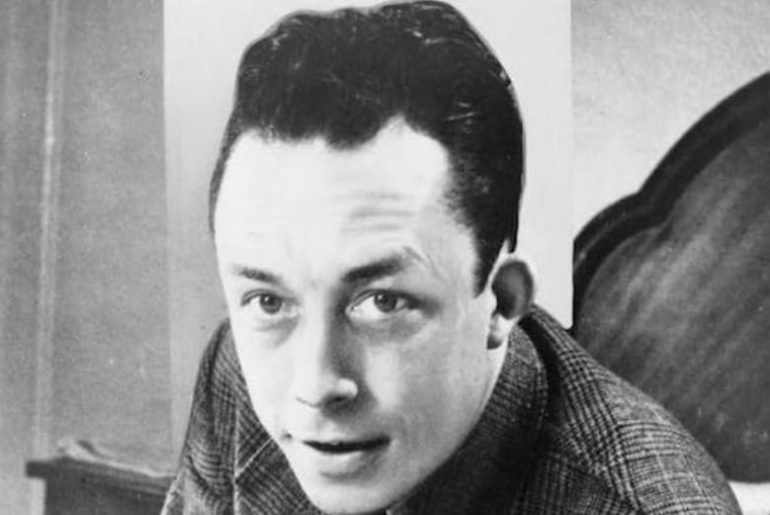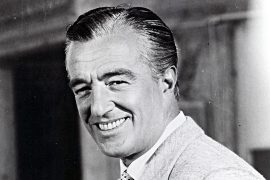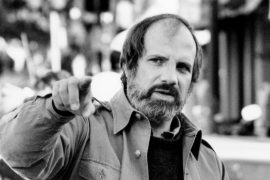As a key figure in existentialism, the French writer significantly influenced the development of intellectual life in Europe after 1945. In his book “The Myth of Sisyphus” (Le mythe de Sisyphe), published in 1942, he developed the philosophy of the absurd. The philosophy of the absurd underlay novels, essays and dramas. Each of his easily read works contains three stages: 1) man is forsaken by God and thrown back on himself 2) his pursuit of happiness over revolt against every form of oppression 3) leading to the realization of the need for human solidarity. As a moralist, he rejected the doctrinal rigor of the existentialism advocated by Jean-Paul Sartre. Furthermore, contrary to Sartre, Albert Camus was a moralist and anti-communist…
Albert Camus was born into poor circumstances on November 7, 1913, the son of an Alsatian farm worker and a Spaniard in Mondovi (Algeria).
Camus was one year old when his father died in World War I. The mother moved to Algiers with the two children. In 1930, as a high school student, Camus suffered his first attack of tuberculosis. More followed. From 1933 to 1936 he studied philosophy at the University of Algiers. In 1933 he married Simone Hié. The marriage was soon dissolved. Camus joined the Communist Party of Algeria and left it a year later (1935). He went on theater tours with the company “Radio-Alger” and founded the “Théâtredu travail” (1935). In 1936 he finished his diploma thesis. In 1937 he was excluded from the state examination for health reasons. He again went on a theatrical tour of Algeria and played amateur roles in classical plays. His work “L’envers et l’endroit” was published and he founded the “Théâtre de l’equipe”. As a journalist, he denounced colonial injustices in Algiers. In 1938 he traveled to Savoy and Florence. The essay “Noces” and the drama “Caligula” were published. He directed “The Brothers Karamazov” by F. M. Dostoyevsky. A year later, in 1939, Camus volunteered for World War II but was turned down due to health problems. The following year he married Francine Faure. Camus was expelled from Algeria and went to Paris as a journalist for the newspaper “Paris-Soir”.
In September 1941 he nevertheless returned to Algeria. In 1942 he joined the “Combat” resistance group in France. The novel “L’étranger” (The Stranger) and the philosophical essay “Le mythe de Sisyphe” (The Myth of Sisyphus) were published. In it, Camus deals with the meaningless and the absurd and achieved literary prestige for the first time. At the end of 1943 Camus worked as an editor at the Gallimard publishing house and published the first “Letter to a German Friend”. In 1943 he became a co-founder of the illegal newspaper “Combat”. In 1944 he made the acquaintance of Jean-Paul Sartre. In 1944 the premiere of the drama “Lemalentendu” (The Misunderstanding) took place in Paris. Camus wrote, among other things, the last “Letter to a German Friend” for the now legal newspaper “Combat” after the withdrawal of the German troops. In 1946 he traveled to America and spoke to American students in New York. In 1947, when the newspaper “Combat” changed hands and political direction, Camus left.
The German premiere of the drama “Caligula” took place and the novel “La peste” (The Plague) was published, which was awarded the “Prize of Critics”. In 1948 and 1949 the dramas “L’étet de siége” (The State of Siege) and “Les justes” (The Just) were published; In “Les justes” Camus dealt with the problem of vigilantism. In 1951 the collection of essays “L’homme révolté” (Man in the Revolt) was published, after which he broke off intensive contact with Sarte after a dispute. A year later, in 1952, Camus resigned from UNESCO because Spain, ruled by Francisco Franko, had been admitted to it. In the same year he broke with Sartre. From 1957 Camus headed the Paris publishing house Gallimard as director. In December 1957, Albert Camus was awarded the Nobel Prize in Literature for his “significant literary creation which illuminates with clear-sighted seriousness the problems of human conscience in our time”. In 1959 the premiere of the drama “Les possédés” (The Possessed) took place.
Albert Camus died in a car accident in Villeblevin on January 4, 1960. He was in the middle of working on “Le Premier Homme”, an autobiographical novel about his childhood and early youth as the son of a father he only dimly knew from the stories he told. The novel was published posthumously in 1994 as a fragment.
What does Albert Camus say?
Albert Camus says: “What remains is a fate where only the end is fatal. Aside from that single fatal inevitability of death, all joy or happiness is nothing but freedom. A world remains in which man is the only master.
What is the absurd Camus?
For Camus, the absurd is the expression of the experience of the meaninglessness and contradiction of human existence; there is no longer an absolute being (no God), no overarching meaning. Therefore, man experiences his own existence and the world around him as meaningless.
What did Camus write?
Camu’s two main philosophical works are the essays “The Myth of Sisyphus” (Le Mythe de Sisyphe, 1944) and “Man in Revolt” (L’Homme révolté, 1951). In addition, his philosophy is also reflected in his novels and plays.
How do you pronounce Camus?
Albert Camus (born November 7, 1913 in Mondovi, French North Africa, now Dréan, Algeria; died January 4, 1960 near Villeblevin, France) was a French writer, philosopher and critic of religion. In 1957 he received the Nobel Prize for Literature for his journalistic oeuvre.
When does the plague of Camus take place?
The novel is set in 1940 but is loosely based on a cholera epidemic in 1849, following the French colonization of Algeria. The city of Oran, on the west coast of Algeria, is visited by mysterious events: rats come out of the sewers and die on the streets.
Is Camus an existentialist?
Albert Camus is the second major exponent of French existentialism. In his 1942 book The Myth of Sisyphus (Le mythe de Sisyphe), Camus developed the philosophy of the absurd.
What does Camus mean by freedom?
For Camus, freedom is not to be found metaphysically in human nature, but rather the only way to lead a happy life in an unequal world.





